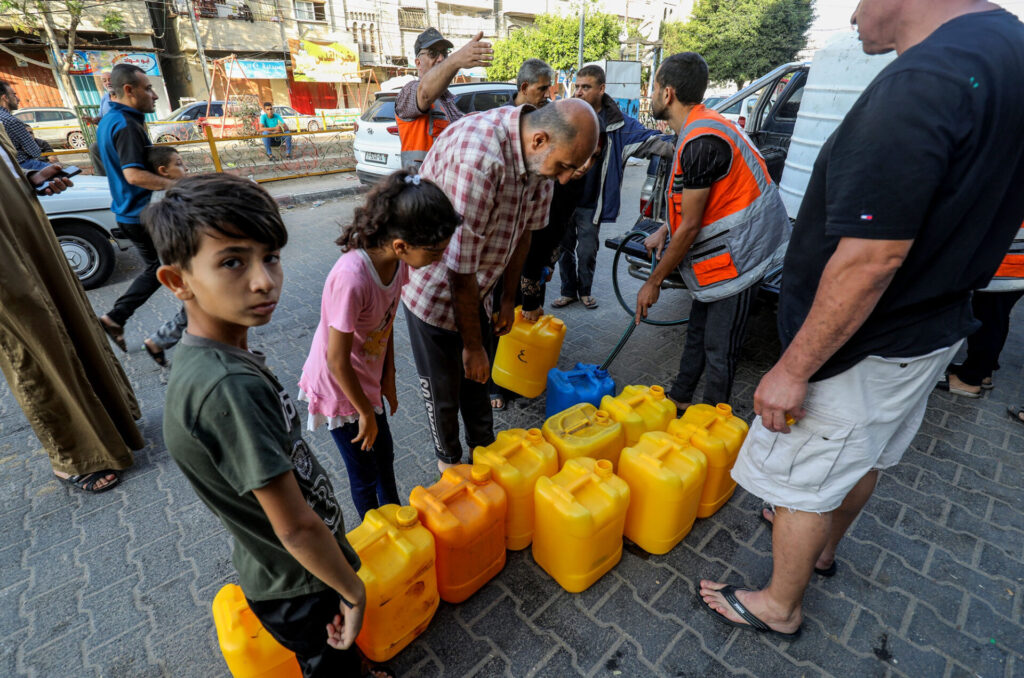Gaza Ceasefire: A Welcome Pause, But Far From Enough
Anera welcomes the news of a pause in hostilities for the distribution of desperately needed humanitarian relief in Gaza. Over the four-day period, we will work around the clock to distribute as much aid as possible to the people whose lives have been devastated by this unprecedented bombing campaign. We are committed to delivering hot meals, food parcels and hygiene kits, and providing cleaning services at overcrowded shelters, psychosocial support activities and free mobile health clinics (see our response log). This pause enables us to bring in additional aid compiled by our staff and partners in Egypt to address critical shortages in Gaza. It also marks the first time in the last 47 days that our staff can mobilize resources in Gaza without fearing for their lives.
But a four-day pause will not come close to solving the problems wrought by seven weeks of incessant bombings. More than 45% of Gaza’s housing units are either destroyed or severely damaged, nearly 40% of schools have sustained damage, and 26 of the 33 medical facilities across Gaza are non-operational. The inflicted damage will require years, if not decades, for reconstruction. Palestinians in Gaza were still recovering from the destruction caused by the 2014 war, nearly a decade ago.
The destruction of homes and issuance of forced displacement orders have led to the internal displacement of 1.7 million people – more than 70% of the population. Gaza ranked among the most densely populated areas globally prior to this assault. Now, with half of all housing units either destroyed or damaged, the population density has surged, resulting in the overcrowding of shelters and the remaining homes.
The World Health Organization has documented tens of thousands of cases of respiratory and diarrheal diseases, accompanied by significant increases in skin diseases and other communicable conditions due to inadequate sanitary conditions. Despite Anera’s daily cleaning efforts at shelters, meeting the overall needs remains impossible given the current circumstances.
Even prior to the recent bombardment, water scarcity was a pressing issue in Gaza. Years of excessive extraction have led to the contamination of Gaza’s main water source, the aquifer, with seawater and wastewater. The situation was already dire, with Palestinians in Gaza consuming an average of 80-90 liters of water per day, falling below the international minimum standard of 100 liters. Now, Gaza’s water network has mostly been rendered nonfunctional by the recent destruction.


In recent weeks, Gaza residents have been forced to survive on an average of only three liters of water per day, with only half of that amount deemed safe for consumption. This falls well below the minimum required for basic living. More individuals are resorting to unclean and unsafe water sources to quench their thirst, leading to a surge in waterborne illnesses and unnecessary suffering.
Repairing and rebuilding Gaza’s water network is critical to ensuring widespread access to drinking water, providing hospitals and healthcare centers with the necessary water for sanitizing equipment, and granting families the means to cook, wash themselves, and attend to their children’s hygiene.
The wastewater and sewage system in Gaza is also in a grave state, and this is of particular concern as we have already seen the start of winter flooding this month.
A temporary ceasefire is not enough. The last 47 days of violence have pushed every sector necessary for life in Gaza beyond the point of collapse. Hospitals have been dubbed “first-aid stations” and entire families have died. Anera, its specialized partners and others have begun to treat the psychological trauma, but it is hard to imagine addressing the full need. The response to this assault isn’t just about reconstructing buildings, homes, hospitals, schools and other structures. It is about restoring people’s lives and rebuilding the spirit of more than two million Palestinians in Gaza.
A “pause” means that after a four-day window, the same torment will be inflicted upon Gaza and only worsen an already unlivable situation. As long as the war continues, even with a brief respite, providing the people of Gaza with the resources and humanitarian aid within their human rights will continue to be an insurmountable challenge. Anything short of a permanent ceasefire cannot be called a successful humanitarian outcome.
[Statistics cited come from UNOCHA’s daily flash updates.]
OUR BLOG
Related
Joint Statement 200+ NGOs call for immediate action to end the deadly Israeli distribution scheme (including the so-called Gaza Humanitarian Foundation) in Gaza, revert to the existing UN-led coordination mechanisms, and lift the Israeli government’s blockade on aid and commercial…
